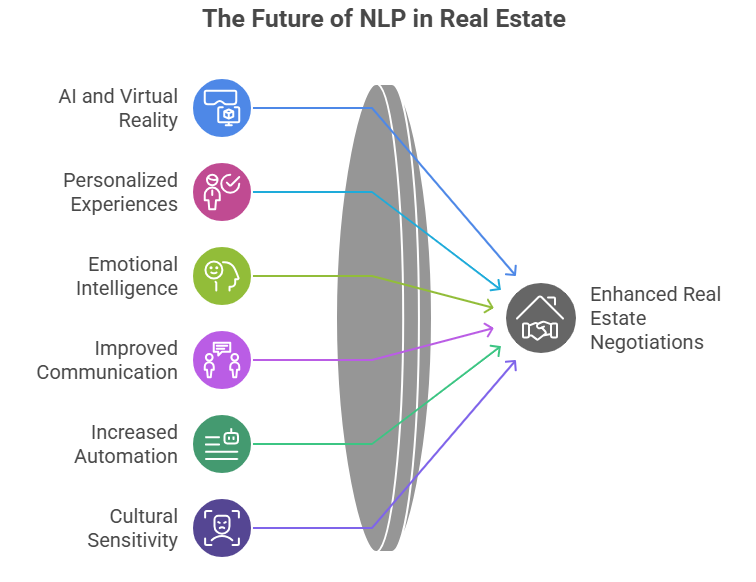Negotiating in Toronto’s real estate market can feel like a game of chess; every move counts. But what if you could predict the next move?
Yes, you can. NLP helps you understand the mind, the language we use, and how it shapes our actions. In real estate, this means better communication, stronger rapport, and the ability to influence outcomes effectively.
Imagine stepping into a negotiation knowing exactly how to read the room, how to handle objections, and how to steer the conversation in your favor. With NLP, these aren’t just skills for top negotiators; they’re skills you can learn and use to your advantage. Let’s explore how NLP can help you confidently and precisely navigate Toronto’s competitive real estate scene.
How NLP Works in Real Estate Negotiations
In real estate, understanding a negotiation’s spoken and unspoken elements is essential for success. NLP (Neuro-Linguistic Programming) is a powerful tool that goes beyond traditional negotiation tactics by helping you understand what clients are saying and what they truly mean, based on their body language, tone, and internal triggers. Here’s how NLP can directly enhance real estate negotiations:

Understanding Buyer and Seller Psychology
NLP helps you understand the motivations and emotional triggers behind a buyer’s or seller’s actions. By identifying their internal needs and concerns, you can address them more effectively. Whether a client is motivated by financial gain, security, or emotional satisfaction, NLP provides the insight you need to respond in ways that appeal to their core motivations.
- Example: A buyer might hesitate on a property because of its price, but their genuine concern might be how it fits into their long-term goals. Using NLP, you can reframe the discussion by focusing on the future value of the property, aligning with their desire for security and long-term benefits.
Building Rapport for Trust and Cooperation
One of the core elements of NLP is building rapport; in real estate, trust is everything. Establishing rapport allows you to influence and guide the negotiation process smoothly. By mirroring body language and matching communication styles, you can foster a connection that makes clients more open to your suggestions.
- Example: If a seller speaks in a calm, measured tone, matching their pace and tone can subconsciously make them feel more comfortable. In contrast, if a buyer is energetic and expressive, matching their enthusiasm can help build rapport and make them feel like you’re aligned with their goals.
Anchoring Positive Emotions to Create Momentum
In real estate negotiations, it’s common for buyers to feel uncertain or overwhelmed, especially when making a major purchase. NLP uses anchoring to tie positive emotions to certain aspects of the negotiation. By anchoring feelings of excitement or satisfaction, you can encourage clients to feel more confident in making a decision.
- Example: During a property tour, when a client shows excitement about a specific feature, like a spacious living room or garden, you can anchor that emotion by saying, “This is exactly the type of space you’ve been looking for, isn’t it?” Repeating similar phrases later will rekindle that positive emotional state, encouraging them to act on their feelings.
Reframing Objections to Turn Them into Opportunities
In real estate negotiations, clients often object to the price, location, or condition of the property. NLP’s reframing technique allows you to turn these objections into opportunities by shifting how the situation is viewed. Instead of seeing an objection as a roadblock, you can help clients see a different angle, presenting the situation more positively.
- Example: If a buyer expresses concern about the property’s price, you can reframe it by highlighting its value and potential appreciation instead of directly lowering the price. For instance, “While the price may seem higher now, consider that this neighborhood has experienced 10% growth in the last 5 years, which means you’re making an investment that will pay off.”
Using Specific Language Patterns to Influence Decisions
NLP teaches the importance of the language used in negotiations. Specific phrases and language patterns can be highly persuasive, guiding clients towards deciding without being pushy. By using language that assumes the decision has already been made or by embedding commands subtly within your conversations, you can increase the likelihood of clients moving forward.
- Example: Instead of saying, “Would you be willing to make an offer?” try, “When you’re ready to make an offer, we can get the paperwork started.” This phrasing assumes that making an offer is the next logical step, creating a sense of certainty and urgency in the client’s mind.
Using the Power of Non-Verbal Cues to Read the Room
NLP also emphasizes the importance of nonverbal communication. In real estate, body language, facial expressions, and tone of voice often speak louder than words. By becoming attuned to these cues, you can better understand a client’s true feelings, which may not be expressed verbally. This allows you to adjust your approach in real time, addressing concerns that clients may not have voiced.
- Example: If a client starts to frown or cross their arms when discussing certain aspects of a property, this could indicate discomfort or disagreement. Recognizing this, you can immediately adjust your strategy by offering additional information or by asking, “What concerns do you have about this aspect?” to open up the conversation and address hidden objections.
Closing the Deal with Confidence and Assumed Commitment
NLP offers powerful tools for closing the deal. One such technique is assumed commitment, which involves framing the conversation as if the deal is already decided. This helps eliminate hesitation and creates a sense of finality in the negotiation process.
- Example: Instead of asking, “Do you think you’ll make an offer?” say, “When we’re ready to submit an offer, we can make sure to include those specific terms you requested.” This assumes the client is already moving forward, subtly guiding them toward a positive decision.
Remember, NLP isn’t about manipulating clients; it’s about understanding them deeply and communicating in a way that resonates with their needs and emotions, ultimately leading to better, more successful negotiations.
NLP Strategies for Overcoming Common Negotiation Challenges

Real estate negotiations are full of twists and turns. It’s not uncommon for clients to raise objections, hesitate, or encounter roadblocks. But what if you could turn those challenges into opportunities? NLP (Neuro-Linguistic Programming) offers strategies to help you address and overcome some of the most common negotiation hurdles. Here’s how:
Handling Price Objections
One of the most common hurdles in real estate negotiations is when a client balks at the price. Whether it’s a buyer who thinks the property is too expensive or a seller who believes they’re not getting enough, price objections can stall the deal. NLP helps you reframe these concerns and present the price more appealingly.
- Strategy: Instead of focusing on the price itself, highlight the value. Use reframing techniques to explain how the property’s unique features or the neighborhood’s potential make it a solid investment. For example, “While the price may seem high, homes in this area have increased by 10% over the past five years, making it a smart choice for long-term gains.”
Overcoming Hesitation and Uncertainty
Clients often hesitate when making decisions, whether it’s a buyer unsure about committing to a purchase or a seller unsure about accepting an offer. This hesitation can stall negotiations and delay progress. NLP helps you overcome this by creating a sense of certainty and confidence.
- Strategy: Use anchoring to trigger positive emotions and reduce doubt. For instance, when a buyer expresses uncertainty, recall a moment earlier when they were excited about a home feature, and use that to reignite their enthusiasm. A phrase like, “I remember how excited you were about the kitchen; imagine how amazing it will be to cook in that space every day,” can tap into those positive emotions and help them feel more confident in their decision.
Navigating Emotional Responses
Negotiations can get emotional, especially when clients feel they’re not being heard or their needs aren’t being addressed. Emotions can derail the conversation, whether it’s frustration over a slow process or disappointment with an offer. NLP helps by giving you tools to manage and redirect these emotions in a positive way.
- Strategy: Active listening is key in NLP. When clients express frustration or disappointment, validate their feelings before offering a solution. For example, “I can see you’re frustrated with the price; it’s a big decision. Let’s discuss what aspects are most important to you so that we can find the right solution.” This shows empathy and shifts the focus away from negative emotions toward a constructive conversation.
Dealing with Deadlock or Stalemate
At some point, every negotiation reaches a deadlock, a point where neither party is willing to budge. When this happens, it’s easy to feel stuck. But with NLP, you can break the stalemate by shifting perspectives and finding common ground.
- Strategy: Use reframing and language patterns to reframe the situation. For example, if the buyer and seller are at an impasse over price, you could reframe the discussion by saying, “Both sides want to ensure this deal is beneficial. Let’s look at how we can find a solution that satisfies both of your key needs.” This encourages collaboration and shows that the goal is a win-win outcome for both sides.
Guiding Clients Toward Commitment
In real estate, it’s common for clients to show interest but hesitate to commit. This lack of commitment can drag out negotiations and create frustration. NLP offers a way to encourage clients to take action by tapping into their motivations and guiding them toward making decisions.
- Strategy: Use the principle of “assumed commitment.” You subtly push clients toward commitment by speaking as if the decision has already been made. For example, instead of asking, “Do you want to make an offer?” say, “When you’re ready to make an offer, we can start drafting the terms.” This makes the next step feel like a natural and easy decision.
Turning Rejection into Opportunity
No matter how skilled you are, you will occasionally face rejection. Whether it’s a buyer who decides not to move forward with a property or a seller who turns down an offer, rejection can feel like a dead end. NLP helps turn these moments into learning opportunities or even opens the door to future deals.
- Strategy: Use feedback and reframing to turn rejection into a positive. For instance, if a client turns down an offer, instead of viewing it as a failure, reframe it as valuable feedback: “I understand this offer isn’t what you were looking for. Let’s review what you would like to see in the next one so we can better align with your needs.”
By incorporating these NLP strategies, you can effectively manage and overcome the common challenges in real estate negotiations. NLP isn’t just about techniques; it’s about understanding what drives and concerns them and how to guide them toward decisions that benefit everyone involved. You can turn negotiation hurdles into stepping stones for success with the right approach.
The Future of NLP in Real Estate Negotiations
As real estate evolves, so do the tools we use in negotiations. NLP has already proven invaluable, but its future promises even more innovation, especially as technology advances.

NLP Meets Technology: AI and Virtual Reality
In the future, NLP will merge with AI and virtual reality to create smarter, more adaptive negotiation tools. AI could analyze a client’s emotional responses in real-time, suggesting more effective communication strategies.
- Example: If a client’s tone shifts negatively during a property tour, AI can detect it and recommend a shift in approach, helping agents address concerns on the spot.
Personalized Real Estate Experiences
With NLP and deep data analysis, agents will create hyper-personalized experiences, predicting client needs based on previous interactions and preferences. This will make negotiations smoother and more efficient.
- Example: An agent could guide a client through a property, highlighting only the features that match their preferences, based on prior conversations and data.
Enhanced Emotional Intelligence in Negotiations
As NLP advances, it will help agents tune into even subtler emotional cues. This ability will allow agents to adjust their approach in real time, addressing any discomfort or hesitation from the client instantly.
- Example: If a buyer seems uncertain about a property, NLP tools could suggest reframing the conversation to emphasize long-term value, helping ease concerns.
Improved Communication Models
In the future, AI-driven NLP tools will offer real-time language analysis, suggesting better phrasing to increase clarity, persuasion, and empathy. This will help agents communicate more effectively and close deals faster.
- Example: If a client is hesitant about an offer, NLP-powered systems could suggest ways to present the offer more appealingly without being pushy.
Increased Automation for Negotiations
NLP will automate more complex negotiation tasks, such as analyzing offers, predicting follow-up timing, and suggesting counteroffers based on client behavior patterns. This will free up time for agents to focus on relationship-building.
- Example: An NLP-powered platform might automatically generate follow-up emails with the best language, ensuring timely responses and increasing the chance of a positive outcome.
Virtual Reality for Negotiation Training
NLP combined with virtual reality could allow agents to practice negotiations in realistic scenarios. This will help new agents develop emotional intelligence and refine their negotiation strategies before meeting real clients.
- Example: An agent could practice negotiations in a virtual environment, where AI simulates client reactions, helping the agent adapt their strategy.
Cultural Sensitivity in NLP
As real estate becomes more global, NLP will evolve to help agents navigate cross-cultural negotiations. Future NLP tools will offer insights into cultural differences, ensuring smoother interactions and more effective communication.
- Example: NLP systems could suggest culturally sensitive language or negotiation tactics based on a client’s background, fostering better rapport and understanding.
The future of NLP in real estate is promising. By combining it with AI, data, and technology, agents will not only streamline negotiations but also create more empathetic and personalized client interactions. Those who embrace these innovations will be better equipped to stay ahead in the competitive real estate market.
Conclusion
NLP is quickly becoming a game-changer in real estate negotiations. By understanding the psychology behind buyer and seller behavior, building rapport, and utilizing powerful language and communication strategies, real estate professionals can navigate even the toughest negotiations with confidence. As the future unfolds, NLP’s integration with AI, VR, and advanced data tools will make negotiations even more efficient, personalized, and impactful.
Whether you’re looking to close a deal, overcome objections, or simply improve your communication, NLP provides the tools to enhance your skills and stand out in Toronto’s competitive real estate market. Embrace these techniques now, and watch how they transform your negotiations, creating stronger connections with clients and more successful outcomes.





